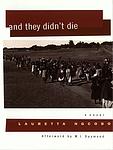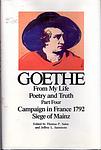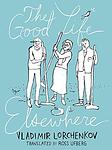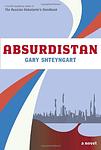The Greatest Russian, South African "Contemporary, Fiction" Books Since 1900
Click to learn how this list is calculated.
This list represents a comprehensive and trusted collection of the greatest books. Developed through a specialized algorithm, it brings together 300 'best of' book lists to form a definitive guide to the world's most acclaimed books. For those interested in how these books are chosen, additional details can be found on the rankings page.
Genres
Contemporary books are a genre that focuses on stories set in the present day, often exploring current social, cultural, and political issues. These books are typically written in a modern style and often feature relatable characters dealing with real-life situations. Contemporary books can cover a wide range of topics, from romance and family drama to coming-of-age stories and thrillers. The genre is constantly evolving to reflect the changing world we live in, making it a popular choice for readers who want to stay up-to-date with the latest trends and issues.
Countries
Date Range
Reading Statistics
Click the button below to see how many of these books you've read!
Download
If you're interested in downloading this list as a CSV file for use in a spreadsheet application, you can easily do so by clicking the button below. Please note that to ensure a manageable file size and faster download, the CSV will include details for only the first 500 books.
Download-
1. Disgrace by J M Coetzee
"Disgrace" is a novel that explores the life of a middle-aged professor in South Africa who is dismissed from his position after having an affair with a student. After losing his job, he moves to the countryside to live with his daughter, where they experience a violent attack that significantly alters their lives. The story delves into themes of post-apartheid South Africa, racial tension, sexual exploitation, and the struggle for personal redemption.
-
2. The Clay Machine-gun by Victor Pelevin
"The Clay Machine-gun" is a surreal and complex novel that explores the nature of reality and illusion. The story is set in post-Soviet Russia and follows a protagonist who has multiple identities, including a poet in 19th-century Russia, a 20th-century psychiatric patient, and a 21st-century advertising executive. The narrative moves between these identities and realities, blurring the lines between them and creating a layered and philosophical exploration of Russian society, identity, and the human psyche.
-
3. The Conservationist by Nadine Gordimer
The book is a character-driven novel set in South Africa during the apartheid era. The protagonist is a wealthy, white industrialist who buys a farm with the intention of using it as a weekend retreat. However, the farm proves to be unprofitable and difficult to manage, and the protagonist's life becomes intertwined with the lives of the black people who live and work on the land. The narrative explores themes of ownership, identity, and the struggle for meaning in a racially divided society.
-
4. And They Didn't Die by Lauretta Ngcobo
This novel explores the resilience and struggles of a group of women in a rural South African village during the apartheid era. As they grapple with oppressive laws, land seizures, and the forced labor system that sends their men to work in distant mines, the women band together to sustain their families and community. Their story is one of survival and solidarity in the face of systemic racism and sexism, highlighting the intersection of personal and political battles while showcasing the strength and endurance of women under extreme hardship.
-
5. Elizabeth Costello by J M Coetzee
The novel follows the life of Elizabeth Costello, a renowned Australian writer, as she navigates through her twilight years. Through eight different narratives, the book explores her perspectives on various topics, including animal rights, the nature of evil, and the difficulty of understanding oneself. The novel is a profound exploration of the human condition, the nature of storytelling, and the conflict between life and art.
-
6. Boyhood: Scenes from provincial life by J M Coetzee
"Boyhood: Scenes from Provincial Life" is a semi-autobiographical novel that explores the author's childhood in South Africa during the apartheid era. The narrative delves into the complexities of family dynamics, racial tension, and the struggle of a young boy trying to understand his place in a divided society. The protagonist grapples with his identity, torn between his Afrikaner heritage and his English schooling, while also navigating the trials of adolescence. The book offers a poignant and often painful reflection on the formative years of a boy growing up in a fraught and turbulent time.
-
7. The Good Life Elsewhere by Vladimir Lorchenkov
"The Good Life Elsewhere" is a darkly humorous and satirical novel that follows a group of Moldovan villagers who embark on a chaotic journey to Italy in search of a better life. Through their misadventures, the author exposes the harsh realities of poverty, corruption, and the desperate measures people are willing to take in pursuit of a brighter future. With a blend of absurdity and poignant social commentary, the novel offers a compelling exploration of the human condition and the universal desire for a better life.
-
8. Absurdistan by Gary Shteyngart
"Absurdistan" is a satirical novel by Gary Shteyngart that follows the story of Misha Vainberg, a wealthy and overweight Russian-American who finds himself stuck in the fictional country of Absurdistan after his father's death. The country is on the brink of a civil war, and Misha must navigate his way through the corrupt and absurd political landscape to get back to America and reunite with his love interest. Along the way, he encounters a cast of eccentric characters and experiences the absurdity of life in a country where everything seems to be falling apart.
-
9. The Mountain And The Wall by Alisa Ganieva
"The Mountain and the Wall" is a thought-provoking novel set in a fictional region of Russia, where a massive wall is being constructed to separate the Muslim population from the rest of the country. Through the eyes of various characters, the book explores the impact of this division on individuals and communities, delving into themes of identity, religion, and the struggle for freedom. As tensions rise and conflicts erupt, the story highlights the complexities of human relationships in a divided society.
-
10. Foe by J M Coetzee
"Foe" is a novel that reimagines the classic tale of "Robinson Crusoe" through a postmodern lens, exploring themes of language, power, and colonialism. The story introduces a female character, Susan Barton, who finds herself cast away on the same island as Crusoe and Friday. Upon her return to England, she seeks out a writer to help tell her version of the events, but struggles with the erasure of her voice and the complexities of storytelling. The narrative delves into the silent history of Friday, whose tongue has been cut out, and the power dynamics between the characters, ultimately questioning the nature of truth and the ownership of stories.
-
11. Rock, Paper, Scissors And Other Stories by Maxim Osipov
"Rock, Paper, Scissors And Other Stories" is a collection of captivating short stories that delve into the lives of ordinary people in a small Russian town. Through these interconnected tales, the author explores themes of love, loss, and the complexities of human relationships. With a keen eye for detail and a deep understanding of the human condition, the stories in this book offer a poignant and thought-provoking glimpse into the lives of individuals navigating the challenges of modern-day Russia.
-
12. Youth by J M Coetzee
"Youth" is a semi-autobiographical novel centered around a young man who leaves his homeland of South Africa for London in the 1960s, hoping to escape his oppressive and dull life. He seeks to immerse himself in the world of art and literature, yearning for a profound and transformative experience. However, he struggles to find his place in this new world, grappling with loneliness, unfulfilling jobs, and failed relationships. The book explores themes of alienation, the search for identity, and the disillusionment of youth.
-
13. The Promise by Damon Galgut
This novel delves into the lives of a white South African family over several decades, tracing the country's transition from apartheid to democracy. At the heart of the story is a broken promise made to Salome, a black woman who works for the family, to gift her a house. This unfulfilled commitment serves as a metaphor for the broader societal promises of justice and equity that remain unkept. Through the lens of one family's complex dynamics, betrayals, and secrets, the narrative explores themes of guilt, racial tensions, and the struggle for redemption, reflecting on the challenges of reconciling with the past in a changing South Africa.
Reading Statistics
Click the button below to see how many of these books you've read!
Download
If you're interested in downloading this list as a CSV file for use in a spreadsheet application, you can easily do so by clicking the button below. Please note that to ensure a manageable file size and faster download, the CSV will include details for only the first 500 books.
Download











